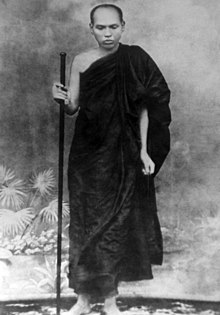Ledi Sayadaw
| Ledi Sayadaw U Ñānadhaja လယ်တီဆရာတော် ဦးဉာဏဓဇ |
|
|---|---|

The Venerable Ledi Sayadaw
|
|
| Religion | Buddhism |
| School | Theravada |
| Lineage | Ledi |
| Education | Agga Maha Pandita, D.Litt. (Hons.) |
| Dharma names | Ñānadhaja ဉာဏဓဇ |
| Personal | |
| Nationality | Burmese |
| Born | 1 December 1846 (13th waxing of Nadaw 1208 ME) Saingpyin, Dabayin Kingdom of Burma |
| Died | 27 June 1923 (aged 76) Pyinmana, Mandalay Province, British Burma |
| Senior posting | |
| Based in | Ledi Monastery, Monywa |
| Title | Sayadaw |
| Religious career | |
| Students | Anagami Thet Gyi |
Ledi Sayadaw U Ñanadhaja (Burmese: လယ်တီဆရာတော် ဦးဉာဏဓဇ, pronounced: [lɛ̀dì sʰəjàdɔ̀ ʔú ɲàna̰dəza̰]; 1 December 1846 – 27 June 1923) was an influential Theravada Buddhist monk. He was recognized from a young age as being developed in both the theory (Abhidharma) and practice of Buddhism and so was revered as being scholarly. He wrote many books on Dhamma in Burmese and these were accessible even to a serious lay person, hence he was responsible for spreading Dhamma to all levels of society and reviving the traditional practice of vipassana meditation, making it more available for renunciates and lay people alike.
Sayadaw began his studies at age 20 in Mandalay at Thanjaun. While there he was considered to be a bright and ambitious young monk but his work was scholarly; there is no evidence that Sayadaw engaged in a serious meditation practice during his years in Mandalay. Leaving Mandalay after a great fire in 1883 caused the loss of his home and his written work to that time, Sayadaw returned to the village of his youth.
Soon, Sayadaw founded a forest monastery in the "Ledi forest" and began practicing and teaching intensive meditation. It was from this monastery that he would take his name, Ledi Sayadaw, meaning "respected teacher of the Ledi forest." In 1885, Ledi Sayadaw wrote the Nwa-myitta-sa (နွားမေတ္တာစာ), a poetic prose letter that argued that Burmese Buddhists should not kill cattle and eat beef, since Burmese farmers depended on them as beasts of burden to maintain their livelihoods, that the marketing of beef for human consumption threatened the extinction of buffalo and cattle and that the practice and was ecologically unsound. He subsequently led successful beef boycotts during the colonial era, despite the presence of beef eating among locals and influenced a generation of Burmese nationalists in adopting this stance.
In 1900, Sayadaw gave up control of the monastery and pursued more focused meditation in the mountain caves near the banks of the Chindwin River.
...
Wikipedia
